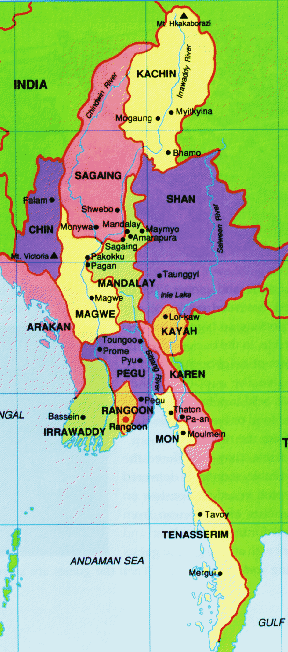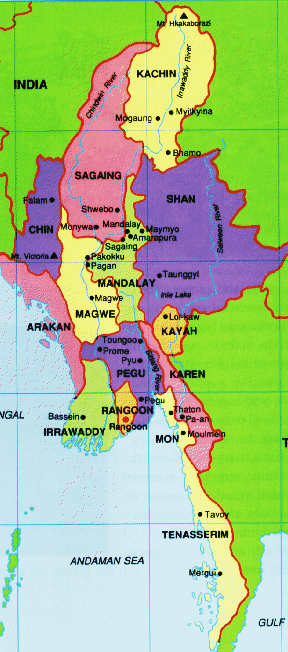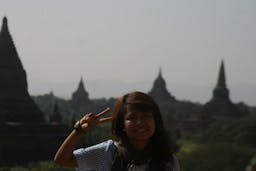Seeking a Space at a Transition
Jan 21, 2015
Story


Instability, unsustainability, inadequate financial resources, lack of professional and technical capacity of human resources, complicated and corrupted registration processes, lack of formal institutional structures, hindrances by the local authorities, a lack of organizational accountability and transparency, and high demands from the community are all major difficulties faced by civil society in Myanmar.
This was not always the case. Myanmar enjoyed democratic rule from independence in 1948 until 1958 and again from 1960 to 1962. During this post-independence period, a rich civil society developed in the cities and towns. The rural areas were not as fortunate however, because of the civil war that raged in the countryside in the late 1940s and early 1950s, which hindered the development of civil society in those parts of the country. Then, in 1963 and 1964, private schools, missionary hospitals, and cinemas were nationalized and library associations were shut down by the Revolutionary Council. After that, public debates ended, and since then the regime has not allowed civil society to function freely, particularly during the period between 1988 and 1990 which was the stormiest time of the country’s political situation.
In May 2008 however, Cyclone Nargis struck, which was one of the most serious disasters in Myanmar’s history, causing many losses and causalities. As a result, several Civil Society Organizations (CSOs) and Community Based Organizations (CBOs) emerged to assist with relief and rehabilitation works. The “NGOs in Myanmar” website (http://www.ngoinmyanmar.org), now counts 128 local NGOs, 99 international NGOs, 5 Red Cross movements, 13 UN agencies, 5 donor agencies, 105 NGO head offices and 9 NGO field offices. Although the exact number is not known, it is true that very few of these local organizations have official registration and hold authorized status. These organizations are trying to help the Myanmar people build a better life, but they constantly face hurdles in their work. Thus, many in the country continue to suffer needlessly.
The Predicaments
Anyone interested in researching the difficulties faced by Myanmar civil society will find that many of the problems are interconnected and operate in a vicious cycle. The country has been run by a military dictatorship, which severely oppresses the people and spends the majority of the country’s budget on the strengthening the army. Almost all of the country’s revenue goes to majors, senior officers and elites and their families who favor the regime. Thus, a high percentage of ordinary citizens live in poverty and cannot acquire basic needs.
As a result, NGOs, CBOs, CSOs, faith based groups, self-help groups, youth groups, student alumni and women groups have become important avenues for filling the needs of the country. Civil society however is often viewed as a threat to the junta whose main concern is to firmly hold onto power as long as possible. Because the government sees a strong civil society as threatening the permanence of their reign, organizations wanting to implement projects or programs are often told they must have an authorized MoU (Memorandum of Understanding) to operate. In order to get a MoU however, the organization must legally register, but the registration process for NGO’s has become a bit of a joke. “One does not necessarily need to know the policies or procedures when registering an organization; they just need to be familiar with a high-profile man such as a general or minister – because THEY are the policy”! Myanmar used to have legislative procedures for setting up an NGO. However, the policy makers themselves made the laws inconsistent and not easily understood. Now, many people do not even know about the existence of those laws.
Highly restricted access to communication technology, the regime’s main goal of isolating and demoralizing activists, the domination of regime-sponsored organizations, educational and cultural limitations, and restrictions in some areas populated by ethnic minorities, are also the limitations faced by CSOs in the country.
Realities from the Ground
Moe Pauk, an organizer from a local CSO where I used to volunteer, worked for a social welfare program initiated by an entrepreneur of a leading IT and media firm. Moe Pauk believes strongly that the development of the country is connected to the well being of children. This fuels her desire to work for poor children at a grassroots level. In July 2009, she, along with her boss, some of the socially-mindful employees from the company, and some interested outsiders who saw the organization’s Facebook initiative, sat together and tried to form a group to support vulnerable orphans in the society. Since that time, she has been a dedicated organizer for MOSN (Myanmar Orphans Support Network), which fulfills an important need in the community.
As an organizer, Moe Pauk really appreciates all of the volunteers who generously contribute their spare time with the group. However, it is not always easy to run an organization using mainly volunteers. Some people say they will join but then do not come to the programs. Others are very late to crucial meetings. She would like to be able to provide some financial incentives to the volunteers but there is not enough funding, which makes her wonder how to make the organization more sustainable. To address the problem she has considered drafting a proposal to a donor agency to request more funding, however, she has been told she cannot apply because she has not registered for official status and thus does not have a MoU – which is a requirement when applying for funding.
Another friend, with whom I have collaborated with, Kyi Par, is a founder of an organization named AFP (Actions for Public). Her organization focuses on empowering PLHA (People living with HIV and AIDS) women by providing them with sewing training, and then linking them with members of the garment industry to sell their products. There is also a microfinance project that provides needed support to women and their families for the betterment of their health and general welfare.
Kyi is going to the United States of America very soon to pursue her master’s degree in Public Administration as a Fulbright scholar. Although she will no longer run AFP, the women she has trained will continue working and using the skills she has provided them. AFP was able to accomplish this even though they never were able to officially register. They faced fewer obstacles from the authorities because they operated on the outskirts of the city and kept a low profile, so the government did not see them as such a threat. It was not always easy to run the program however, due to the usual problems of lack of funding, transparency and accountability that often plague humanitarian assistance projects. Kyi hopes that the progress the organization, which she overcame many obstacles to set up, made will be sustained and the women will continue to improve their skills after she leaves, without too much interference from the government.
I too have experienced the joys and frustrations of working with NGOs and trying to make positive change for people. First I volunteered with a small organization based in British Council Burma’s library for two years. There, I started as an apprentice with few skills and little knowledge about development, but later became a leading organizer. Currently, I work part-time for an international NGO, and for two years have been running a small CSO named MMM (Metta Moe Myanmar) with my friend with the hope that it will become a youth-led change agent in the country. Our organization does not have MoU and we are facing many issues like other groups. Moreover, our MMM has transportation barriers in running a community-school in a very remote area.
Women like Moe Pauk and Kyi Pyar, aged 25 and 28 respectively, and myself, are young energetic activists with many hopes for the future, the country, and ourselves. We, along with organizations like MOSN and AFP, plus volunteers, interns, beneficiaries, stakeholders, and all of the brothers and sisters who are members of civil society, are devoted to bringing about positive change, but are faced with many challenges on a daily basis. Whenever I ask people why they do not register their organization, they reply that it is very difficult. When I ask why it is difficult, most do not know exactly what the problem is. Even those who keep a low profile and deliver their services very carefully and cleverly can still face obstacles. As a result, many organizations remain unstable, their services remain inconsistent and the situations of the people they are trying to help will remain unchanged, unless the government starts to appreciate the contribution these organizations can make to society.
The Reasons a Vibrant Civil Society is Important
A former economic professor, author, and motivator for youth who worked as a senior UN officer in Italy, and now adviser at the UN in Myanmar, said that Northern Italy is more developed than its Southern part because the North has a vibrant civil society which contributes much to the well-being of the locality. Similarly, in a developing country like Myanmar, the role of civil society is crucial for progress and can ultimately lead to a more democratic nation. As a result of efforts of NGOs and others in civil society, more children have access to things like education. Also, through civil society organizations, many youth get exposure to UN, EU and international leading organizations, and gain knowledge on globalization and the importance of quality education, all of which can be very useful later in their lives and in the development of the country. Responsible NGOs can introduce us to ideas like transparency, accountability and participatory methods, which are the basic principles of good governance. Together, these collective ideas can slowly help us improve, unite our voices, and bring about democracy piece by piece.
A Golden Opportunity
Khaing Min from the Thingungyun township committee of NDF (National Democratic Force) which is one of the leading opposition political parties to the military government and won a proportion of seats in the very recent November 7 election, the first for the country after 1990 said that he personally hopes that civil society and authentic democratic allies in the coming Parliament can make a slice of positive change despite the fact that the USDP (Union Solidarity and Development Party), the regime’s party, won over 75 percent in the election. He believes during this transition democratic candidates should support civil society organizations. A number of newly-elected local representatives will be focused on establishing legal frameworks, fundamental infrastructure and community development in their constituencies. He would like to urge CBOs and CSOs to make their voices heard in parliament. Civil Society must shout loudly about the limitations they have been facing and propose and mandate effective policies for civil society organizations.
Looking on the bright side, there are many possible ways in which the international community can support marginalized Myanmar people and many opportunities for international donors to widely-engage and strengthen civil society and democracy movements from the bottom up. Although communication channels such as internet and mobile technologies are still sensitively controlled, we all must connect, communicate, network, partner and share the resources and information we have. We must remember to practice transparency, accountability and participatory decision making whenever working with other organizations and inside our own groups. Networks like “Myanmar NGO Network” and “Myanmar Youth Forum” can also have a strong voice as a group. Rural youth can present their on-the-ground experiences, and urban youths can share their resources, which are only available in cities like Yangon. Exchange programs between rural and urban people should be promoted, as well as strategic meetings among organizations. The media also has an important role to play in assisting civil society. Building self-esteem, cooperation, and a sense of belonging in a democratization process, can steadily transform the political myth of ordinary people in Myanmar, and gradually lead to a way for changing into the liberal democratic country.
The import thing is to “Think out of the box.” Myanmar is in transition and this can be a golden opportunity for civil society. Grab it!
This article is part of a writing assignment for Voices of Our Future, which is providing rigorous web 2.0 and new media training for 30 emerging women leaders. We are speaking out for social change from some of the most unheard regions of the world.




